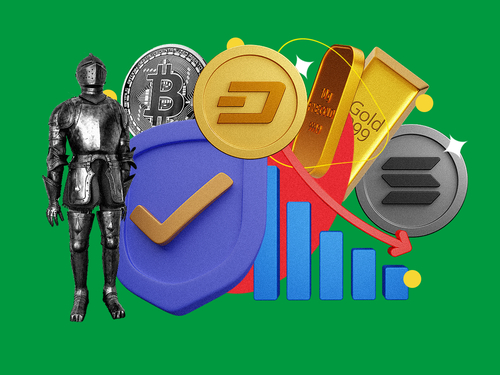

Can Gold Help Shield You From Crypto Losses?
Thanks to its low correlation to several major cryptocurrencies, gold might be able to help crypto investors protect against loss.
Updated Apr 15, 2022
Many companies on MoneyMade advertise with us. Opinions are our own, but compensation and in-depth research determine where and how companies may appear.
Crypto
Gold
Balanced Investing
Crypto investments can come crashing down just as quickly as they can go to the moon. The key is timing, but given the volatile and unpredictable nature of the crypto market, it's incredibly difficult to time.
Even though gold and Bitcoin hold a moderate positive correlation, it can be helpful to zoom into the performance of the two assets in recent years.
Instead, some crypto investors prefer to use investment tricks to protect themselves against massive losses in the market. Stop-loss orders, for example, are one of the most popular tools used by savvy traders to avoid losing too much. If you're HODLing for the long-term, you may also choose to diversify your coin holdings across a variety of coins so that some might perform well while others are falling.
That can be difficult, though, as most cryptocurrencies are highly correlated with each other. As it turns out, there's one asset that doesn't seem to be highly correlated with the cryptocurrency market: gold.
Correlation between gold and cryptocurrency
Correlation between gold and cryptocurrency
Asset pair | Correlation coefficient |
|---|---|
Bitcoin (BTC) and gold | 0.5562 |
Ethereum (ETH) and gold | 0.4855 |
Cardano (ADA) and gold | 0.4800 |
Dogecoin (DOGE) and gold | 0.4222 |
Solana (SOL) and gold | 0.3389 |
Ripple (XRP) and gold | 0.3373 |
When balancing a crypto-heavy portfolio, some might find it helpful to look at assets that have a low correlation to the cryptocurrency market. Because they don't tend to move in the same direction as major cryptocurrencies, these assets will be less likely to lose value in the event of a crash in crypto.
Our asset correlation study found that gold has held a fairly low monthly correlation to the major crypto coins included in our research for the last three years. The resulting correlation coefficients range from 0 to 1.0—the closer to 0, the weaker the correlation, and the closer to 1.0, the stronger the correlation.
Bitcoin holds the highest correlation to gold (as measured by the iShares Gold Trust) at a moderate positive correlation of 0.5562, and Ethereum, Cardano, Dogecoin, Solana, and Ripple all hold a low positive correlation to gold. Solana and Ripple hold the lowest positive correlation to gold, with a correlation coefficient of 0.33, making these coins nearly uncorrelated with gold. While all of these coins are currently in the top 12 cryptos by market capitalization according to CoinMarketCap, some are certainly more accessible and easily traded than others. Ripple, for example, isn't as widely available on centralized crypto exchanges. This might make the coin notably less liquid, which could factor into why it holds such a low correlation to gold.
Performance of gold during recent Bitcoin crashes
Performance of gold during recent Bitcoin crashes
Even though gold and Bitcoin hold a moderate positive correlation, it can be helpful to zoom into the performance of the two assets in recent years. The biggest crashes in Bitcoin's price over the past few years occurred in May 2021, when the price fell 30% in one week, and at the tail end of 2021, when the price fell more than 45% over the course of a few months.
When looking at the iShares Gold Trust (IAU) over the same periods, the price of gold maintained its value. In fact, it experienced a slight increase during the May 2021 crypto crash and stayed level during the crypto price drop at the end of 2021.
Crypto vs gold as an inflation hedge
Crypto vs gold as an inflation hedge
Some investment experts have posited that crypto could be the new "gold standard," so to speak, in terms of an asset that can serve as an inflation hedge. In theory, these inflation hedge assets should hold a low or negative correlation to the inflation rate.
However, the low correlation between gold and crypto during the pandemic suggests that crypto may not, in fact, serve as a good replacement for gold for investors looking to protect their portfolios against inflation loss. As inflation rose in 2021 and investors flocked to assets that can serve as a store of value, Bitcoin did show itself to be a competitor against gold for the title of preferred inflation hedge. Even still, gold prices rose by 6% during the first two months of 2021.
It remains to be seen whether these trends will continue, but gold is definitely an asset worth keeping your eye on, whether you're looking to protect yourself against crypto losses or hedge against inflation—or both.